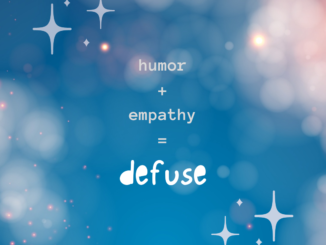My kids built an obstacle course together out of pillows and mats in our house. My son went on it first. When he got to the end, he flopped down on the mats, laying down across several of them and blocking the way.
My daughter had waited her turn and now she asked him to move. He did not move.
She got annoyed. “Apollo. You’re blocking it! It’s my turn!”
He didn’t move and he didn’t say anything.
She looked at me to see if I knew what was going on, and I looked at her too, so she knew that I did. She waited to see if I would fix it. I did not say or do anything. I waited to see what she would do. She hadn’t asked for my help.
“Apollo, please move out the way please,” she said, asking nicely.
“Apollo, mooooove NOW or I’m not your best friend,” she said, threateningly.
“Apollo, it’s not fair. It’s not your turn,” she said, appealing to logic.
“Apollo, you’re blocking it and I can’t go there!” she said, explaining the problem.
From an adult frame of reference, one kid was in the “wrong” and one kid was in the “right”. But play doesn’t work like that. Play morphs and shifts as all parties stretch and grow and solve problems, together or apart. I took a deep breath and let go of my adult desire to jump in and move the kid in the “wrong” or to butt in and try to make suggestions for the kid in the “right”. No one had asked for my help. Everyone was trying to figure it out, trying on different roles in the play and in the problem-solving.
I reminded myself that I am not invested in this being solved one right way and that I am not taking either kid’s side. One child losing interest and going to do something else is equally as valid of a solution to a childhood squabble as both kids taking turns. There are no stakes here — or maybe, the stakes are whether or not the children will learn that they can manage a conflict independently, and whether or not I will learn that I can keep my mouth shut! I kept my mouth shut.
I doubt that Apollo had an end goal in mind the first time she called his name and he didn’t move — this wasn’t some “master plan” or anything. He processes language a bit more slowly than people usually expect; it might very well have just taken him an extra few seconds to get up if he had been left to his own devices. But now she had made it A Thing and since he’s 5 and his job is to play and experiment with power and control and autonomy, he was quite content just lying there not saying anything and seeing what happened.
She climbed up on top of him and began pulling his arm, trying ineffectually to physically move him. Then she started slapping him on the shoulder, at which point I reached over and blocked her hand. “Hey, I’m not going to let you hit people.”
“But he’s blocking me,” she said.
“Ahh, yeah. I see that,” I answered neutrally.
“Can you tell him to go away?”
I looked at him and made a guess, since she had been continuously verbally insisting that he move for a few consecutive minutes now. “I wonder if he just needs some time to take a break.”
“He can take a break for the couch,” she protested, very reasonably, I might add.
“Hmm, yeah. That would make sense,” I mused out loud. A solution had been proposed in the room, to the debate; I am not the arbiter of whether or not the solution would work.
But before Apollo could do anything, Summer ran and got his water bottle. She came back and held it up to his lips. “You just need a break, kitty? You’re too tired? I help you get a drink.”
Apollo shook his head and meowed.
“Kitty, come on. You got stuck, here, drink some water and you’ll feel better.”
Apollo took a long drink of water. Summer was silent while he did. I felt the barrage of verbal demands lift from his shoulders. He stood up.
And the game morphed into playing cats, and then “cat doctor”, and then on into other things. My daughter never went on the obstacle course.


